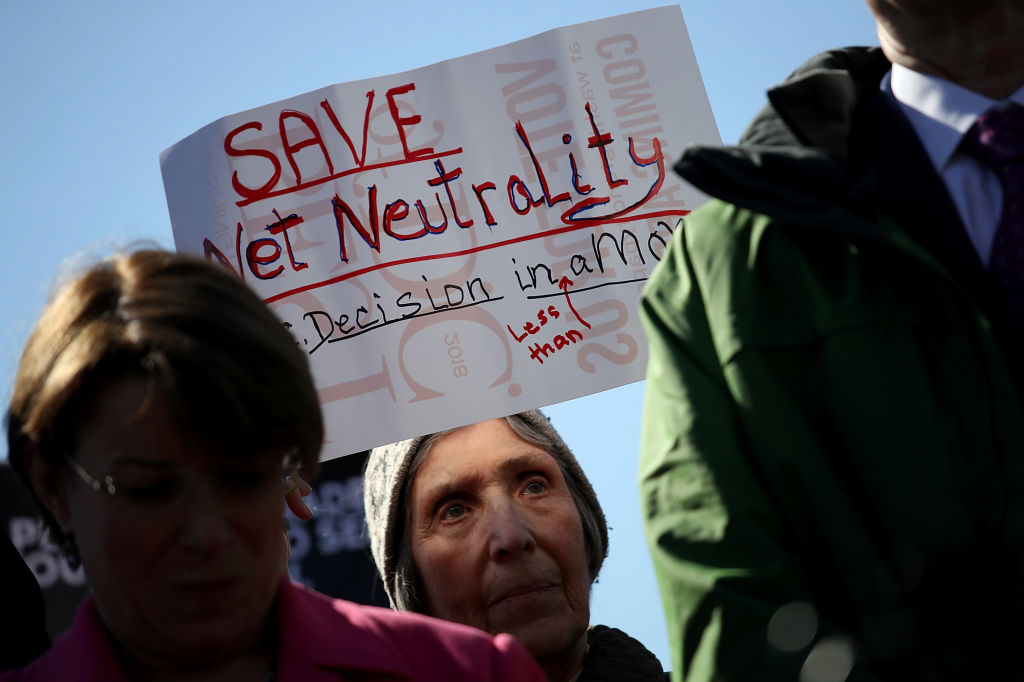Net neutrality is officially dead in the United States (for now)


A free daily email with the biggest news stories of the day – and the best features from TheWeek.com
You are now subscribed
Your newsletter sign-up was successful
The Federal Communications Commission's 3-2 decision to scrap net neutrality — the idea that all legal internet traffic must be treated the same by internet service providers — takes effect Monday. Killing net neutrality is a victory for FCC Chairman Ajit Pai, who wrote the rules and pushed them through with the help of the other two Republican FCC commissioners, and for ISPs. Without net neutrality, critics warn, giant corporations like Verizon and Comcast can throttle traffic to sites they don't own or partner with, or give customers who pay more better connections to services like Netflix. The Senate passed a bill in May reinstating net neutrality, but the House is not expected to take it up.
The fight now moves to federal court, where some net neutrality proponents are suing to overturn Pai's decision on the grounds that it was arbitrary and without justification. Telecoms are mulling legal action against Oregon, Vermont, and Washington state, which have all passed laws preserving net neutrality at the state level; California lawmakers are pushing through a similar law, and six other governors have tried to enact net neutrality through executive orders.
Telecoms insist they have no current plans to throttle traffic to certain sites. "We're all going to wake up on Monday, and we're all going to be able to stream cool shows off Netflix or Hulu or YouTube," said Jonathan Spalter, the leader of the trade group USTelecom, speaking in the lingo of youth. Gene Kimmelman, the president of public interest group Public Knowledge, said the end of net neutrality and approval of AT&T's purchase of Time Warner — a judge is set to rule either way on Tuesday — "could be a one-two punch to consumers and online competition. ... The combination of no net neutrality and video consolidation creates new bottlenecks that empower the traditional media industry to raise prices and limit online competition."
The Week
Escape your echo chamber. Get the facts behind the news, plus analysis from multiple perspectives.

Sign up for The Week's Free Newsletters
From our morning news briefing to a weekly Good News Newsletter, get the best of The Week delivered directly to your inbox.
From our morning news briefing to a weekly Good News Newsletter, get the best of The Week delivered directly to your inbox.
A free daily email with the biggest news stories of the day – and the best features from TheWeek.com
Peter has worked as a news and culture writer and editor at The Week since the site's launch in 2008. He covers politics, world affairs, religion and cultural currents. His journalism career began as a copy editor at a financial newswire and has included editorial positions at The New York Times Magazine, Facts on File, and Oregon State University.
-
 The Olympic timekeepers keeping the Games on track
The Olympic timekeepers keeping the Games on trackUnder the Radar Swiss watchmaking giant Omega has been at the finish line of every Olympic Games for nearly 100 years
-
 Will increasing tensions with Iran boil over into war?
Will increasing tensions with Iran boil over into war?Today’s Big Question President Donald Trump has recently been threatening the country
-
 Corruption: The spy sheikh and the president
Corruption: The spy sheikh and the presidentFeature Trump is at the center of another scandal
-
 TikTok secures deal to remain in US
TikTok secures deal to remain in USSpeed Read ByteDance will form a US version of the popular video-sharing platform
-
 Unemployment rate ticks up amid fall job losses
Unemployment rate ticks up amid fall job lossesSpeed Read Data released by the Commerce Department indicates ‘one of the weakest American labor markets in years’
-
 US mints final penny after 232-year run
US mints final penny after 232-year runSpeed Read Production of the one-cent coin has ended
-
 Warner Bros. explores sale amid Paramount bids
Warner Bros. explores sale amid Paramount bidsSpeed Read The media giant, home to HBO and DC Studios, has received interest from multiple buying parties
-
 Gold tops $4K per ounce, signaling financial unease
Gold tops $4K per ounce, signaling financial uneaseSpeed Read Investors are worried about President Donald Trump’s trade war
-
 Electronic Arts to go private in record $55B deal
Electronic Arts to go private in record $55B dealspeed read The video game giant is behind ‘The Sims’ and ‘Madden NFL’
-
 New York court tosses Trump's $500M fraud fine
New York court tosses Trump's $500M fraud fineSpeed Read A divided appeals court threw out a hefty penalty against President Trump for fraudulently inflating his wealth
-
 Trump said to seek government stake in Intel
Trump said to seek government stake in IntelSpeed Read The president and Intel CEO Lip-Bu Tan reportedly discussed the proposal at a recent meeting
